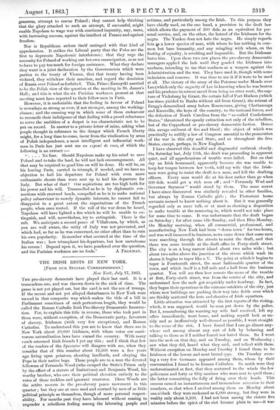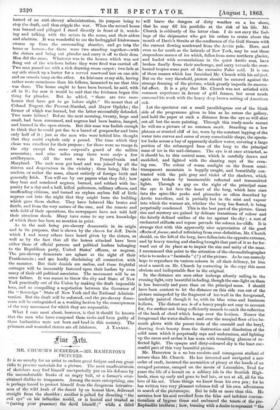THE IRISH RIOTS IN NEV YORK.
[FROM OUR SPECIAL CORRESPONDENT.]
New York, July 17, 1863. 'THE pro-slavery democrats have played their last card. It is a tremendous one, and was thrown down in the nick of time. The game is not yet played out, but the card is not the ace of trumps. If the recent and not yet allayed disturbances in New York were named in that composite way which makes the title of a bill in Parliament sometimes of such portentous length, they would be called the Roman Catholic Irish Pro-Slavery Democratic Insurrec- tion. For, to explain this title in reverse, those who took part in them were, without exception, of the Democratic party, favourers of slavery, Irishmen (with very few exceptions), and Roman Catholics. To understand this you are to know that there are in New York about 20,000 Irishmen, with whose votes our omni- vorous naturalization laws have cursed the country. With many nuch esteemed Irish friends I yet say this ; and I think that few of the readers of the Spectator will disagree with me, when they consider that of this number about 19,500 were a few years ago living upon potatoes, shooting landlords, and obeying the Pope in their native bogs. These people are to a man the devoted followers of Fernando Wood (who escaped the State's Prison only by the effect of a statute of limitations) and Benjamin Wood, his worthy brother, who owe their political elevation entirely to the votes of these reckless and ignorant creatures. These Woods are the active movers in the pro-slavery peace movement in this quarter ; but they are at once used and scorned by men of as little political principle as themselves, though of more personal respect- ability. For months past they have laboured without ceasing to engender a rebellious feeling among the labouring people and
artizans, and particularly among the Irish. To this purpose they have chiefly used, on the one hand, a provision in the draft law which allows the payment of 300 dols. as an equivalent for per- sonal service, and, on the other, the hatred of the Irishman for the negro. The Yankee does not hate the negro. He simply regards him os a lower species of man, with whom he has nothing in com- mon but bare humanity, and any mingling with whom, on the footing of equality, is revolting and impossible. But the Irishman hates him. Upon these two raw places the pro-slavery democratic managers applied the lash until they goaded the Irishmen into madness, intending to use that madness as a weapon against the Administration and the war. They have used it, though with some indecision and remorse. It was time to use it if it were to be used at all. The victory of the army of the Potomac under Meade over Lee (which only the sagacity of Lee in knowing when he was beaten and his prudence in retreat saved from being an utter rout), the cap- ture of Vicksburg by Grant, the certain fall of Port Hudson (which has tince yielded to Banks without aid from Grant), the retreat of Bragg's demoralized army before Rosencranz, giving Chattanooga and Knoxville, the keys of the country, to the national forces, and the defection of North Carolina from the "so-called Confederate States," threatened the speedy extinction not only of the rebellion, but of the Copperhead or pro-slavery democratic faction. Hence this savage outburst of fire and blood ; the object of which was practically to nullify a law of Congress essential to the prosecution of the war in this city and State, and so throughout the free States, except, perhaps, in New England.
I have observed this dreadful and disgraceful outbreak closely. On Saturday last, July 11th, the draft was proceeding in apparent quiet, and all apprehensions of trouble were lulled. But on that day an Irish housemaid, apparently because she was unable to keep her tongue between her teeth, told my wife that the Irish- men were going to resist the draft to a man, and kill the drafting officers. Every man would die at his door rather than go when 300 dole. would get a rich man off ; and " Fernandy 1Vud and Governor Saymoor " would stand by them. The same secret I have since discovered was similarly revealed in other families, but always by Roman Catholic girls ; the Protestant house servants seemed to know nothing about it. But it was generally regarded only as mere talk, or at most as showing a disposition to make trouble at the mustering in, which would not take place for some time to come. It was unfortunate that the draft began on Saturday ; for after came idle Sunday, and then Blue Monday. On Monday morning, when all commercial, professional, and manufacturing New York had been "down town" for two hours, and was well immersed in business, news came down that some men were marching through the streets to resist the draft, and that there was some trouble at the draft office in Forty-sixth street. The city is on a long narrow island about two miles wide ; but about two miles above the junction of the rivers which wash its shores it begins to taper like a V. The point at which it begins to taper is Fourteenth street, the most fashionable quarter of the town, and which itself is a full mile and a half from the business quarter. You will see then how remote the scene of the trouble at first, Forty-sixth street, was from the centre of the city, and understand how the mob got so quickly under headway. In fact, they began their operations in the extreme outskirts of the city, just where new buildings are pushing their way into fields over which are thickly scattered the huts and shanties of Irish squatters.
Little attention was attracted by the first reports of the rioting. which, it was supposed, would be soon put down by the police. But I, remembering the warning my wife had received, left my office immediately, went home, and making myself look as un- tidy and as inoffensively well-dressed as possible, I went straight to the scene of the riot. I have found that I can go almost any- where and among almost any sort of folk by behaving and talking to them as if I neither feared nor hated them. So I went into the mob on that day, and on Tuesday, and on Wednesday ; saw what they did, heard what they said, and talked with them. Without exception on Monday and Tuesday I found them to be Irishmen of the lowest and most brutal type. On Tuesday even- ing a very few Germans appeared among them, whom by their conversation I found to be Roman Catholics. So much were they underestimated at first, that they scattered to the winds the few policemen and forty or fifty marines who were sent to quell them ; the latter committing the folly of firing over their heads. This success caused an instantaneous and tremendous accession to their numbers, so that when I arrived among them on Monday about one o'clock they were reckoned as 6,000 strong, but they were in reality only about 3,500. I had not been among the rioters five minutes before the spirit of the riot became plain to me—it was hatred of an anti-slavery administration, its purpose being to stop the draft, and thus cripple the war. When the second house was burned and pillaged I stood directly in front of it, watch- ing and talking with the actors in the scene, and their aiders and abettors. It was wonderful to see the bedraggled Irishwomen swarm up from the surrounding shanties, and go into the house or houses—for there were two standing together—with the rioters and bring out plunder and carry it of to their dens. Men did the same. Whatever was in the houses which was not flung out of the windows before they were fired was -carried off. Two men passed me with a rich drawing-room carpet ; two lads at my side struck up a barter for a carved rosewood box on one side and an ormolu lamp on the other. An Irishman at my side, having rather more conscience than his fellows, lamented to me that this was done. The house ought to have been burned, he said, with all in it ; for now it would be said that the Irishmen began this thing for plunder. But he added, "there are two more houses that have got to go before night." He meant that of Colonel Nugent, the Provost-Marshal, and Mayor Opdyke ; the former of which was burned, but the latter successfully defended. Two more houses ! Before the next morning, twenty, large and small, had been consumed, and negroes had been beaten, hanged, and burned in the open streets. But this man was foolish enough to think that he could put fire to a barrel of gunpowder and burn only half of it ; just as the men who were behind him thought that they could explode only a pound. The time which they chose was excellent for their purpose ; for there were no troops in the city except the mere corporal's guard of the militia armouries ; and nine miles away there were only- a few artillerymen. All the rest were in Pennsylvania and Maryland. The mob soon got head and was joined by all the thieves and desperadoes in the vicinity ; these being, like the nucleus, or rather the maw, almost entirely of foreign birth and generally Irish. You will see by our papers what they did ; how they beat and murdered negroes, burned, and robbed with im- punity for a day and a half, killed policemen, military officers, and unoffending citizens, and turned an orphan asylum full of little negroes out into the night that they might burn the building which gave them shelter. They have behaved like brutes and fiends, and from the very nature of the case, and the remote and wide field of their operations, the newspapers have not told half their atrocious deeds. Many have come to my own knowledge of which there has been no mention in print.
As to the mob being pro-slavery democratic in its origin and in its purposes, that is shown by the cheers for Jeff. Davis which I and many others have heard given by the rioters, as well as by the fact that all the houses attacked have been either those of official persons and political leaders belonging to the Republican party, United States' officers, or negroes. The pro-slavery democrats are aghast at the sight of their Frankenstein ; and are loudly disclaiming all connection with the monster. But their denials are useless, and these frightful outrages will be inexorably fastened upon their leaders by even many of their old political associates. The movement will be an utter failure. It was meant to throw the city and State of New York practically out of the Union by making the draft imPossible here, and so compelling a negotiation between the Governor of tho " Sovereign " State of New York and the National Adminis- tration. But the draft will be enforced, and the pm-slavery demo- crats will be extinguished as a working faction by the consequences of the very movement for which they are responsible.
What I care most about, however, is that it should be known that the men who have composed these mobs and been guilty of these barbarities were not born and bred in this country. The prisoners and wounded rioters are all Irishmen. A YANKEE.































 Previous page
Previous page